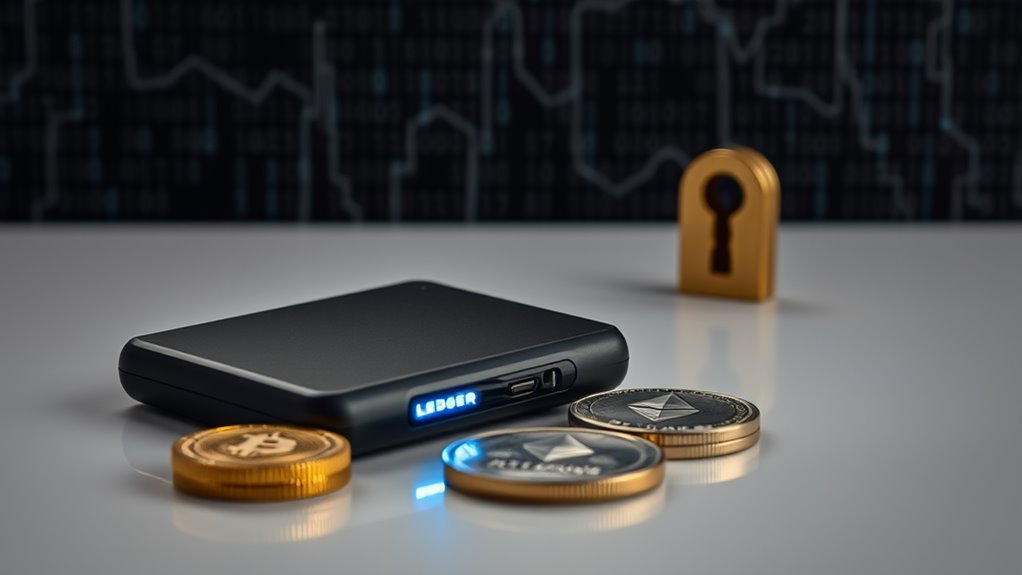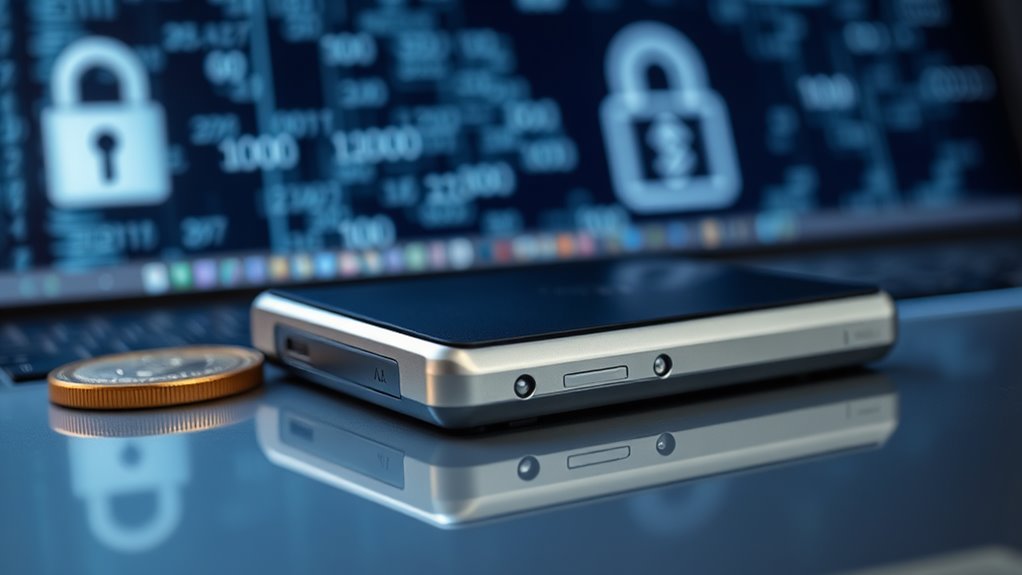Exploring Ledger Wallets for Cryptocurrency Security
Note: This post may contain affiliate links, and we may earn a commission (with No additional cost for you) if you make a purchase via our link. See our disclosure for more info. The crypto world is constantly changing. This content is for informational purposes only and not financial, legal, or professional advice So, please verify the info on the cryptocurrency provider’s websites.
Ledger wallets are like Fort Knox for your cryptocurrency. They stash private keys securely offline, keeping cybercriminals at bay. With a fancy EAL6+ Secure Element chip, they're tough—think armored tank level tough. User-friendly? Absolutely. Anyone can set one up without a tech degree. Plus, the BOLOS operating system keeps applications running safely and separately. So, if you care about your Bitcoin and Ethereum, you should definitely consider these wallets. Stick around, there's more to uncover.
 cryptocurrency security with ledgers">
cryptocurrency security with ledgers">When it comes to keeping cryptocurrency safe, Ledger wallets are like a fortress for your digital assets. Seriously. If you're going to store your hard-earned Bitcoin or Ethereum, you need something more reliable than a sticky note or a poorly secured app. Ledger wallets take that job seriously, and they come equipped with some impressive tech.
At the heart of these wallets is the Secure Element chip, specifically the ST33K1M5. This little piece of engineering is not just any chip; it's rated EAL6+. That's like saying your wallet is the armored tank of crypto storage. It stores private keys offline, which means hackers can't just waltz in and grab your information from the cloud. Nope, not happening. It's locked away tighter than Fort Knox, and that's exactly how it should be.
The Secure Element chip in Ledger wallets is the ultimate fortress for your private keys, keeping hackers at bay.
Now, let's be real. The world of cryptocurrency can be a bit of a circus. You've got scams, phishing attempts, and more twists than a soap opera. But with a Ledger wallet, you can breathe a sigh of relief. Your private keys are safe and sound, far from the prying eyes of cybercriminals. It's almost like having a bodyguard for your digital stash. In addition, the Ledger wallets certified by ANSSI ensure that your assets are protected with industry-leading security measures. Furthermore, using a hardware wallet is essential for keeping private keys offline and away from hackers.
But wait, there's more! The design is sleek and user-friendly, so you won't need a degree in rocket science to use it. Plug it in, follow the instructions, and voila! You're on your way to securing your assets. It's not just about storing coins; it's about peace of mind. The BOLOS operating system further enhances security by ensuring all applications run independently of each other.
In a world where everyone seems to be out to get your money, Ledger wallets stand as a bulwark. They take security seriously, and that's a stimulating change. So, if you want your crypto to stay safe, you might want to reflect on making that fortress your own.
Frequently Asked Questions
Can Ledger Wallets Store Multiple Cryptocurrencies Simultaneously?
Absolutely, Ledger wallets can store multiple cryptocurrencies at once.
We're talking thousands here, from Bitcoin to NFTs. Imagine cramming a whole coin collection into one neat device.
Each wallet is segregated, so no asset cross-contamination—thank goodness for that!
Plus, the Ledger Live app keeps everything organized. It's like a digital filing cabinet but way cooler.
Who doesn't want to juggle different cryptocurrencies without losing track? It's pretty slick.
What Happens if I Lose My Ledger Wallet?
If someone loses their Ledger wallet, panic might set in.
But wait! They've got a safety net—a recovery phrase. That 24-word lifeline can restore access on any compatible wallet.
Without the PIN, thieves can't touch the crypto, which lives on the blockchain. Just three wrong PIN entries? Boom! Device wiped.
Are Ledger Wallets Compatible With All Operating Systems?
Not all operating systems are created equal, and neither are Ledger wallets. They play nice with Windows, macOS, Linux, Android, and iOS.
But don't even think about using them with Chromebooks. Some models are Bluetooth-enabled, while others are stuck in the past.
Sure, there's a Ledger Live app for setup, but if you're on an ARM-based Linux system, you're out of luck.
It's a bit of a mixed bag, really.
How Often Should I Update My Ledger Wallet Firmware?
Firmware updates for a Ledger wallet? Simple: check regularly. Not every month or quarter—just whenever you get a nudge from Ledger Live.
Don't ignore it! Those updates patch vulnerabilities. Miss one, and you might be walking a tightrope.
After updating, double-check your firmware version.
And hey, Android users can do it on their phones, but iPhone folks need a computer.
Can I Use a Ledger Wallet for Online Purchases?
Can a Ledger wallet be used for online purchases? Well, sort of. It's not exactly a straightforward process.
You can't just whip it out like a credit card. You'll need to link it with third-party services.
Sure, it supports over 1,000 cryptocurrencies, but you'll be dealing with fees and extra steps. Plus, don't forget, you need that physical device on hand.
Forget it, and you're stuck. So, good luck with that!











